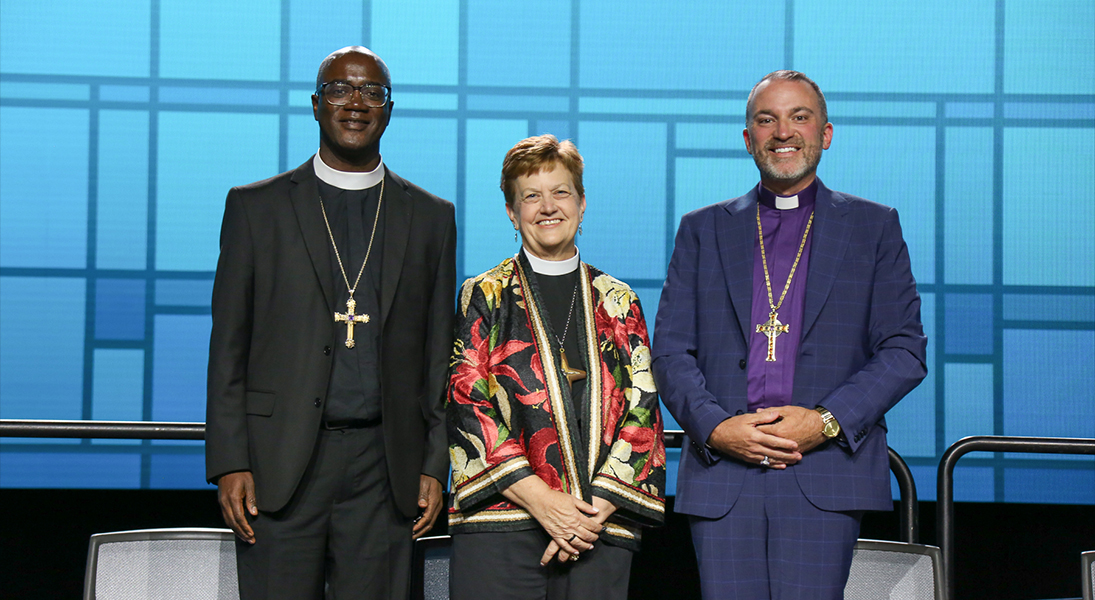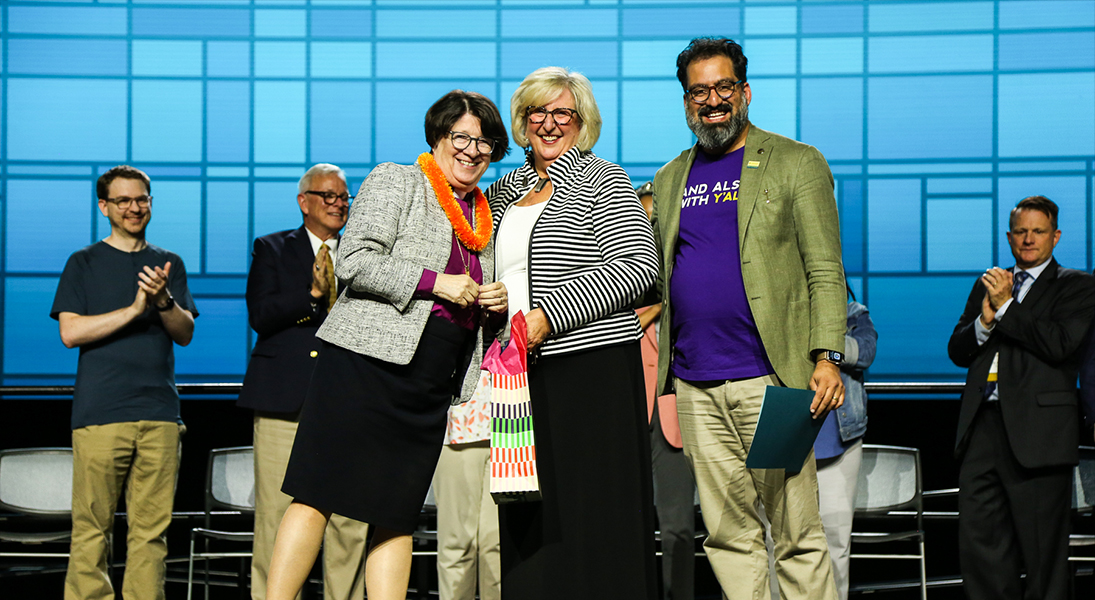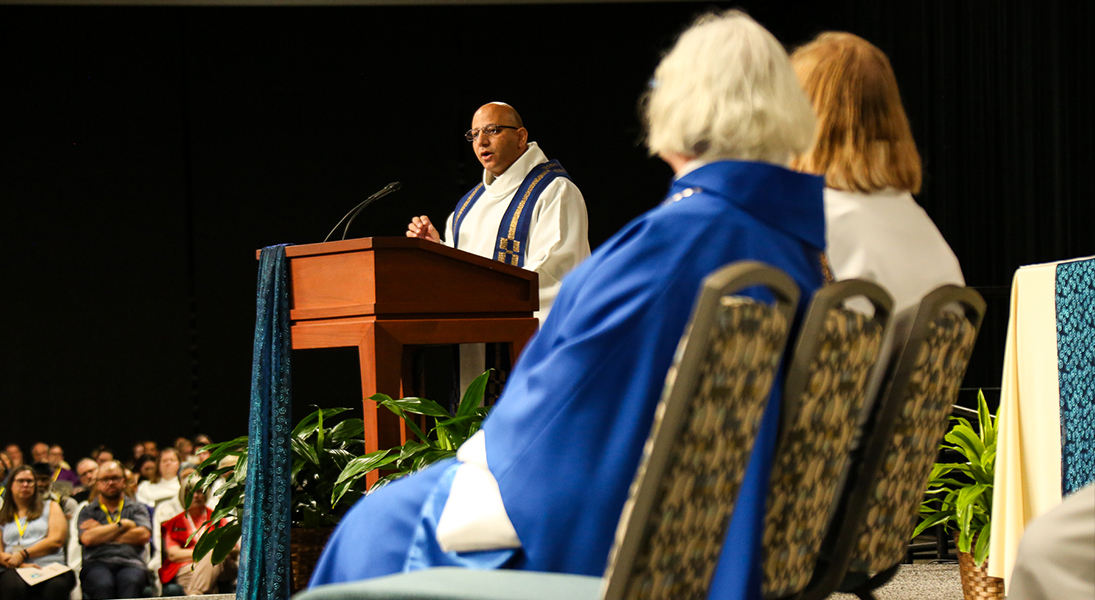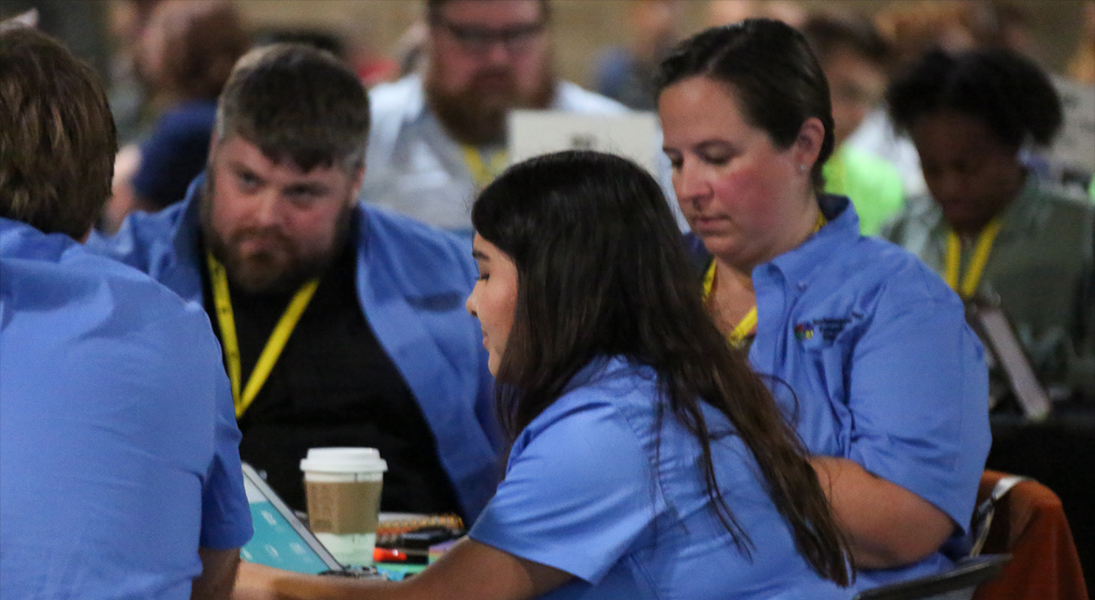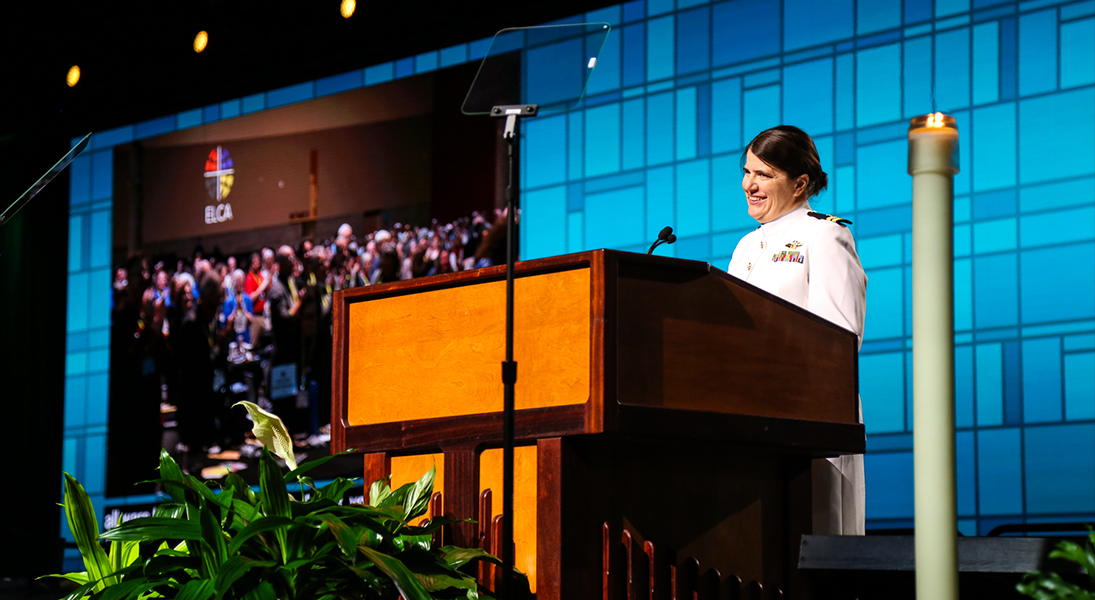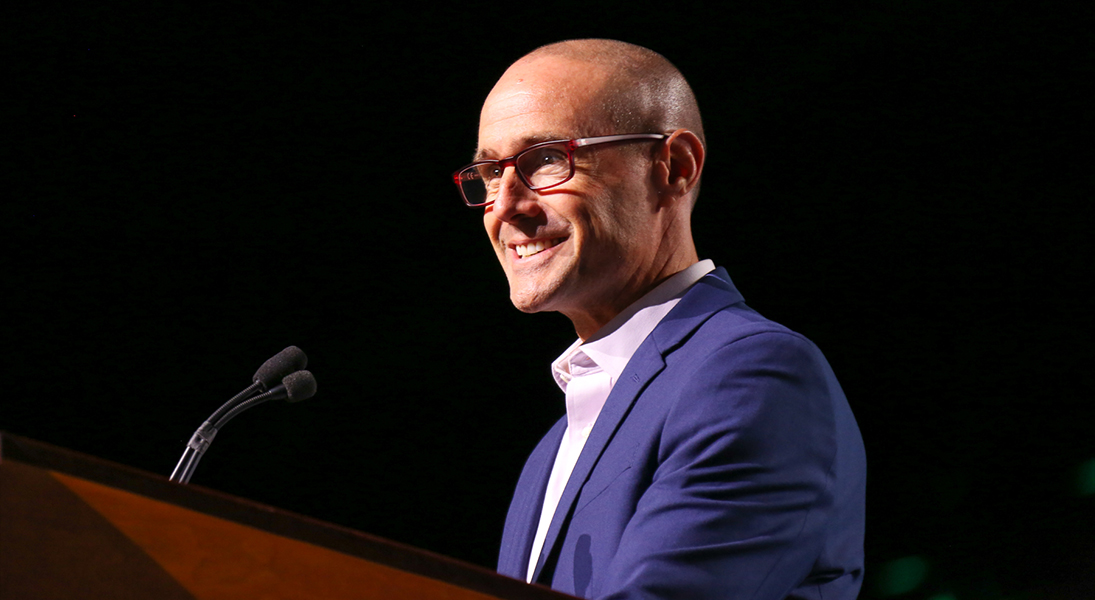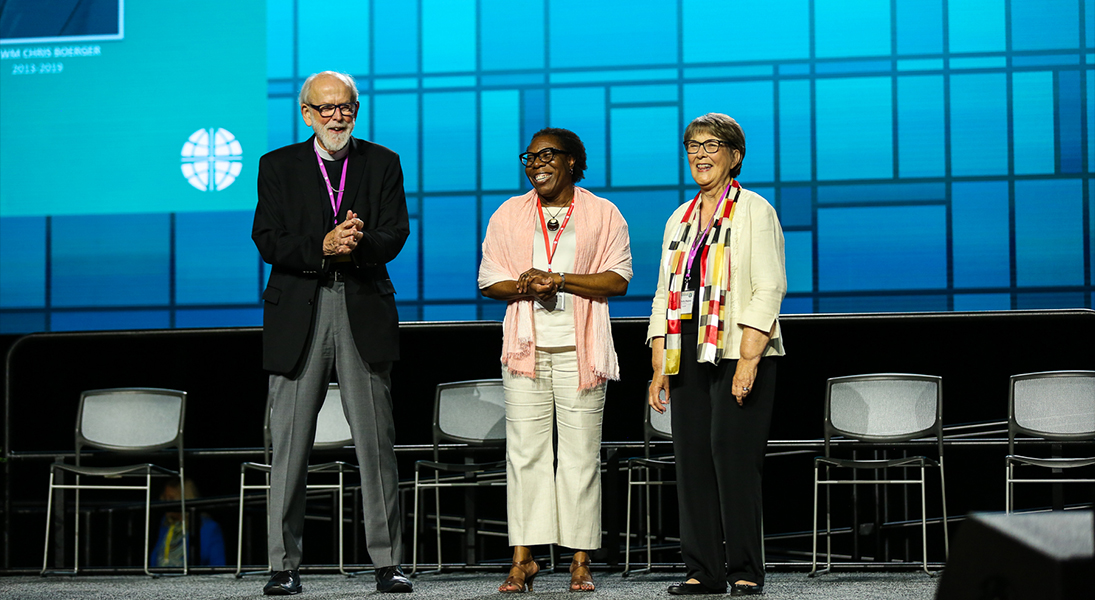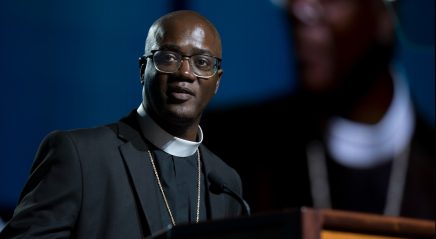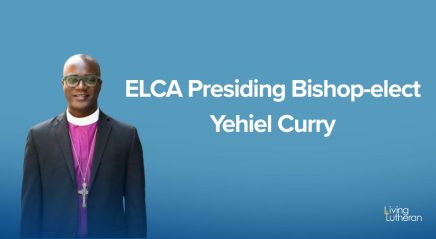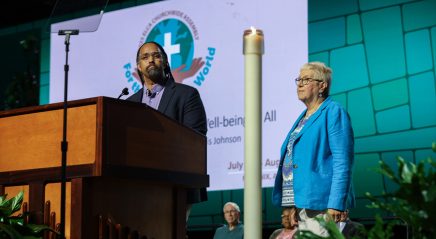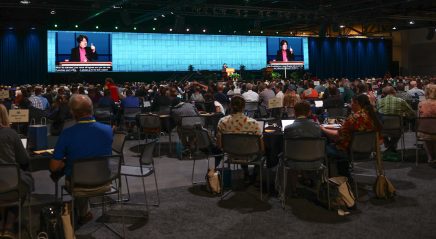On the third day of the 2025 ELCA Churchwide Assembly, Yehiel Curry, bishop of the Metropolitan Chicago Synod, was elected presiding bishop of the ELCA.
Curry was elected on the fifth ballot, with 562 votes to 237 votes for Kevin Strickland, bishop of the Southeastern Synod. Curry will be installed Oct. 4 in Minneapolis.
In addition to the election, the assembly celebrated the church’s ecumenical partnerships, honored its federal chaplains and discussed a memorial regarding Palestine.
Susan Johnson, national bishop of the Evangelical Lutheran Church in Canada (ELCIC), presided over a service of Holy Communion, at which Imad Haddad, bishop-elect of the Evangelical Lutheran Church in Jordan and the Holy Land (ELCJHL), preached.
Plenary five
The afternoon session started with a theological presentation on the 2025 Churchwide Assembly’s theme, “For the Life of the World,” which celebrates the Nicene Creed’s 1,700th anniversary. Chad Rimmer, rector and dean of Lutheran Theological Southern Seminary at Lenoir-Rhyne University in Hickory, N.C., led the presentation.
Drawing on global and ecumenical traditions, Rimmer called for interdependence and inclusion, especially of marginalized voices. The Sankofa symbol, a bird flying forward while reaching back, illustrated Rimmer’s call for the ELCA to carry tradition into transformative futures. He concluded by emphasizing that discernment should be led by grace, not law, saying, “We are becoming, and this is a holy moment of moral imagination.”
Following Rimmer’s presentation, the fourth ballot for presiding bishop was held.
Earlier, during plenary four, the seven nominees on the third ballot gave their addresses to the assembly via video feed in solidarity with one nominee who was not present in person. There was no election on the third ballot, and the three nominees who received the most votes—Curry, Strickland and Tracie Bartholomew, bishop of the New Jersey Synod—were invited to respond to three questions during plenary five.
After the fourth ballot, Curry and Strickland were the final two nominees.
Before voting on the fifth ballot, the assembly approved (678-120) suspending the rules to have the two candidates share a Scripture passage that shapes and sustains them. Another motion failed (517-218) to suspend the rules before voting so all three nominees from the previous ballot could address the question.
After Curry’s election, Elizabeth Eaton, ELCA presiding bishop, greeted the former church officers who were present, including Mark Hanson, former presiding bishop; Kathy Magnus, former vice president; and Linda Norman, former treasurer.
Sue Rothmeyer, ELCA secretary, then presented her final report to the assembly. She spoke about her 41 years in public ministry, from her time as a lay minister at Iowa State University in Ames to her current role. She thanked her staff for support and offered gratitude for how the church has renewed its commitment to research and evaluation, with that work formally returning to the secretary’s office. She acknowledged the ongoing decline in membership consistent with trends prior to the COVID-19 pandemic but also noted that weekly worship attendance has grown by 130,000 since 2021.
“In short, while we continue to see gradual declines in membership and participation, the data shows a return to long-term patterns—not a sharp or unexpected drop-off,” Rothmeyer said. “And we are seeing signs of renewed engagement.”
Eaton then presented Rothmeyer with the Servus Dei Award, given to ELCA officers at the completion of their terms. Eaton celebrated Rothmeyer’s more than 30 years of leadership in the ELCA.
To close out the afternoon session, Christina Mauntel, a U.S. Navy chaplain, spoke about the way federal chaplaincies represent God’s extended hands in their mission around the world, and how naval chaplains provide ministry to those serving in the military, supporting those of the ELCA faith and facilitating space for all beliefs.
Plenary six
The final session of the day featured remarks from Haddad and Johnson.
Haddad, who was elected in June, addressed the current situation in the Holy Land. “Our church is small, and as Christians, we are a small minority in Palestine and Israel—but we have a mighty mission,” he said.
More than 200 Christian families have left the West Bank since the Israeli government launched its attack on Gaza in 2023, Haddad said, which is a significant number in a population that represents just 1% of the Palestinians there. He spoke of the endurance among the ELCJHL, using the Arabic word sumud, meaning steadfast endurance and resilience. “Sumud means we are abiding,” he said.
After the remarks, Eaton and Johnson presented a gift of local art as a sign of solidarity with the churches in North America and the Indigenous Christian community in the Holy Land.
Johnson, who will retire this fall, followed with her own remarks, addressing the nature of being a national bishop. “There are few people who are your colleagues who share the same experiences,” she said. “Bishop Eaton has been a wonderful partner to me and, therefore, my church.”
Johnson spoke about how the financial realities facing the ELCIC have led the church to rethink its mission, to boldly live into God’s call and to rework how the church operates and exists. “We need to be more open to listening to how the Spirit is calling us,” she said.
In other business, the assembly approved (774-10) the ELCA’s budget for 2026-2028.
A report from the Memorials Committee then returned to consideration of a memorial on Palestine, which centered on the debate regarding Hamas’ attack on Israel on Oct. 7, 2023, and Israel’s response since.
During plenary four, Memorial D4 had been amended (752-22) to include mention of the Arab and Middle Eastern Ministries desk and the Association of Lutherans and Arab and Middle Eastern Heritage. Another amendment (502-272) to the memorial was passed in that session, adding “[occupation] of Gaza and the West Bank, while maintaining the right and sovereignty of the State of Israel to exist.”
In plenary six, an amendment was passed (579-198) to insert the language, “To recognize the rights of the State of Israel and a sovereign State of Palestine to exist side by side, as per the ELCA’s historic stated position, and per existing UN Security Council Resolutions 242, 338, 1397, 1515, 2334.”
The assembly approved:
- Memorial D4—Stand of Palestinian Rights and End to Occupation of Palestine: Calls (742-38) for the ELCA, its members, congregations, synods and churchwide units to advocate for human rights and a just peace for Palestinians and Israelis by supporting policies that end the occupation. To join the World Council of Churches in calling for an immediate end to the mass killing in Gaza. To urge the Office of the Presiding Bishop to petition U.S. leaders to recognize and act to end the genocide against Palestinians, halt military aid to Israel used in Gaza, and support Palestinian statehood and U.N. membership. To reject forced displacement and settler violence. To promote prayerful engagement and solidarity with those working for justice and peace, including ELCA partners in the region. And to amplify the voices of local partners and strengthen the ELCA’s advocacy through the Office of the Presiding Bishop, the Middle East and North Africa Desk, the Sumud initiative, and the Witness in Society team, among other offices.
As the evening ended, the first ballot for ELCA secretary was announced. There were 640 legal ballots cast, with 104 candidates receiving votes. Matthew Riegel, bishop of the West Virginia-Western Maryland Synod, received the most votes (61). The second ballot will be held in plenary eight on July 31.




